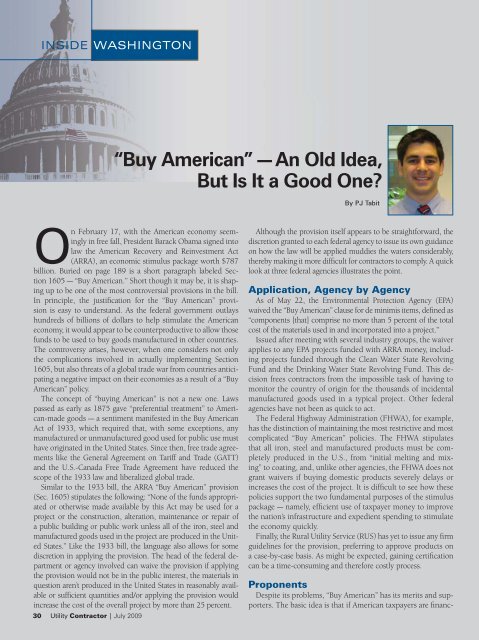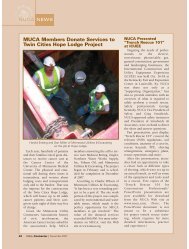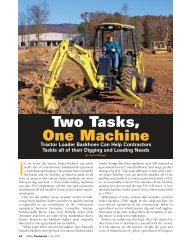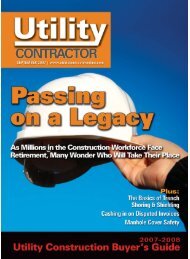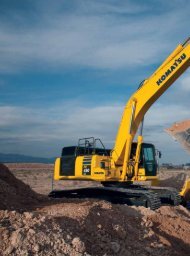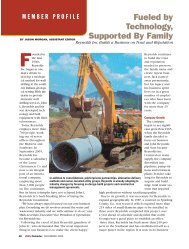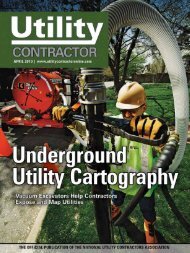View Full July PDF Issue - Utility Contractor Magazine
View Full July PDF Issue - Utility Contractor Magazine
View Full July PDF Issue - Utility Contractor Magazine
- No tags were found...
Create successful ePaper yourself
Turn your PDF publications into a flip-book with our unique Google optimized e-Paper software.
INSIDE WASHINGTON“Buy American” — An Old Idea,But Is It a Good One?By PJ TabitOn February 17, with the American economy seeminglyin free fall, President Barack Obama signed intolaw the American Recovery and Reinvestment Act(ARRA), an economic stimulus package worth $787billion. Buried on page 189 is a short paragraph labeled Section1605 — “Buy American.” Short though it may be, it is shapingup to be one of the most controversial provisions in the bill.In principle, the justification for the “Buy American” provisionis easy to understand. As the federal government outlayshundreds of billions of dollars to help stimulate the Americaneconomy, it would appear to be counterproductive to allow thosefunds to be used to buy goods manufactured in other countries.The controversy arises, however, when one considers not onlythe complications involved in actually implementing Section1605, but also threats of a global trade war from countries anticipatinga negative impact on their economies as a result of a “BuyAmerican” policy.The concept of “buying American” is not a new one. Lawspassed as early as 1875 gave “preferential treatment” to American-madegoods — a sentiment manifested in the Buy AmericanAct of 1933, which required that, with some exceptions, anymanufactured or unmanufactured good used for public use musthave originated in the United States. Since then, free trade agreementslike the General Agreement on Tariff and Trade (GATT)and the U.S.-Canada Free Trade Agreement have reduced thescope of the 1933 law and liberalized global trade.Similar to the 1933 bill, the ARRA “Buy American” provision(Sec. 1605) stipulates the following: “None of the funds appropriatedor otherwise made available by this Act may be used for aproject or the construction, alteration, maintenance or repair ofa public building or public work unless all of the iron, steel andmanufactured goods used in the project are produced in the UnitedStates.” Like the 1933 bill, the language also allows for somediscretion in applying the provision. The head of the federal departmentor agency involved can waive the provision if applyingthe provision would not be in the public interest, the materials inquestion aren’t produced in the United States in reasonably availableor sufficient quantities and/or applying the provision wouldincrease the cost of the overall project by more than 25 percent.30 <strong>Utility</strong> <strong>Contractor</strong> | <strong>July</strong> 2009Although the provision itself appears to be straightforward, thediscretion granted to each federal agency to issue its own guidanceon how the law will be applied muddies the waters considerably,thereby making it more difficult for contractors to comply. A quicklook at three federal agencies illustrates the point.Application, Agency by AgencyAs of May 22, the Environmental Protection Agency (EPA)waived the “Buy American” clause for de minimis items, defined as“components [that] comprise no more than 5 percent of the totalcost of the materials used in and incorporated into a project.”<strong>Issue</strong>d after meeting with several industry groups, the waiverapplies to any EPA projects funded with ARRA money, includingprojects funded through the Clean Water State RevolvingFund and the Drinking Water State Revolving Fund. This decisionfrees contractors from the impossible task of having tomonitor the country of origin for the thousands of incidentalmanufactured goods used in a typical project. Other federalagencies have not been as quick to act.The Federal Highway Administration (FHWA), for example,has the distinction of maintaining the most restrictive and mostcomplicated “Buy American” policies. The FHWA stipulatesthat all iron, steel and manufactured products must be completelyproduced in the U.S., from “initial melting and mixing”to coating, and, unlike other agencies, the FHWA does notgrant waivers if buying domestic products severely delays orincreases the cost of the project. It is difficult to see how thesepolicies support the two fundamental purposes of the stimuluspackage — namely, efficient use of taxpayer money to improvethe nation’s infrastructure and expedient spending to stimulatethe economy quickly.Finally, the Rural <strong>Utility</strong> Service (RUS) has yet to issue any firmguidelines for the provision, preferring to approve products ona case-by-case basis. As might be expected, gaining certificationcan be a time-consuming and therefore costly process.ProponentsDespite its problems, “Buy American” has its merits and supporters.The basic idea is that if American taxpayers are financ-


